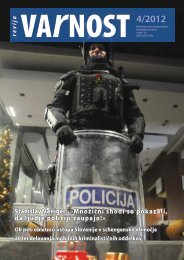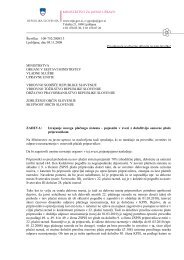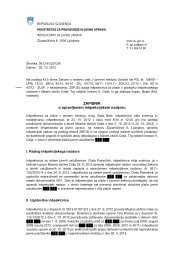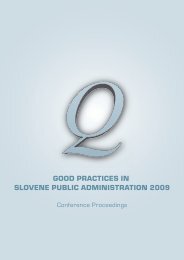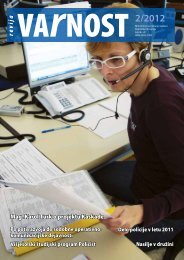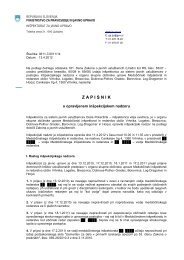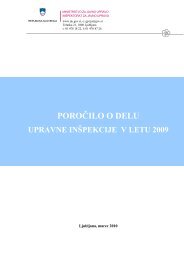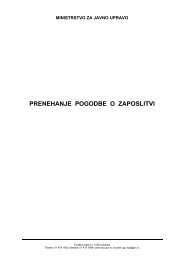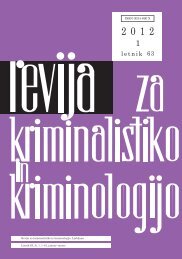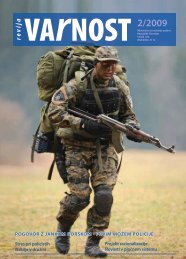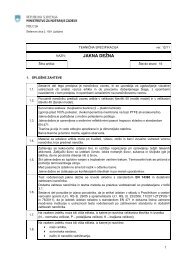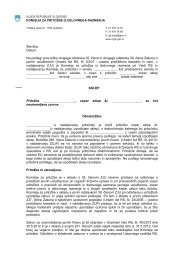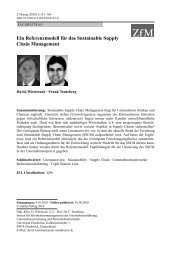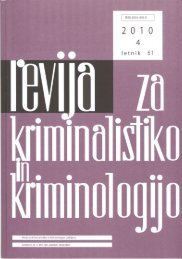Revija 4, 2011 - Ministrstvo za notranje zadeve
Revija 4, 2011 - Ministrstvo za notranje zadeve
Revija 4, 2011 - Ministrstvo za notranje zadeve
You also want an ePaper? Increase the reach of your titles
YUMPU automatically turns print PDFs into web optimized ePapers that Google loves.
Franc Brinc: Družbeno vzdušje v <strong>za</strong>vodih <strong>za</strong> prestajanje kazni <strong>za</strong>pora in v prevzgojnem domu Radeče leta 2010*<br />
Social climate in correctional institutions and the Juvenile Detention<br />
Centre Radeče in 2010<br />
Franc Brinc, LL. D. Retired Research Fellow of the Institute of Criminology at the Faculty of Law in Ljubljana, Slovenia<br />
In 2010, the Institute of Criminology at the Faculty of Law conducted the sixth consecutive measurement of social climate in<br />
correctional institutions and the Juvenile Detention Centre Radeče (1980, 1985, 1995, 2000, 2005, 2010). The purpose of the research<br />
was to establish how inmates, juvenile delinquents and correctional workers in closed, semi-open and open prison facilities perceive<br />
the social climate in these facilities. In 2010, the social climate was measured for the first time in all 13 correctional institutions of<br />
the Republic of Slovenia in which inmates serve prison sentences and in the Juvenile Detention Centre in Radeče, in which juveniles<br />
sentenced to the educational measure of committal to a juvenile detention centre are placed.<br />
Measurement of the social climate was conducted on the basis of the Moos questionnaire CIES, Form C, which had already been<br />
used in the previous measurements. Questionnaires were completed by 679 prison inmates and juveniles and (92.13 percent of the<br />
sample) and 528 correctional workers (95.65 percent of the sample). Statistical data processing was carried out with the program PASW<br />
– STATISTICS 18.<br />
The research results indicate that inmates and workers at open facilities experience a more favourable climate than their counterparts<br />
in semi-open and closed facilities. Inmates gave low scores to the elements relating to the rehabilitative orientation of institutions<br />
(openness of expression, solving personal problems, autonomy and assistance) and high scores to the element of supervision, which<br />
means that they perceived institutions as mainly control-oriented institutions without any rehabilitative efforts. The correctional<br />
personnel of closed, semi-open and open prison facilities are similarly mainly oriented towards keeping order and supervising<br />
inmates and juveniles. In the opinion of correctional personnel, inmates and juveniles, the social climate in all correctional institutions<br />
deteriorated during the period 2005 – 2010, the rehabilitation orientation of institutions declined, while efforts at maintaining order<br />
and supervising inmates increased. These findings indicate that the supervision of inmates for security reasons has become the primary<br />
consideration in the enforcement of prison sentences and the application of the measure of committal to a juvenile detention centre. The<br />
rehabilitative orientation is impeded by strong supervision, low autonomy, low level of solving personal problems and low openness of<br />
expression. This situation requires the additional professional training of correctional workers for work with problematic and dangerous<br />
inmates and juveniles, aimed at modifying the attitudes of correctional workers and increasing their motivation for work. Training<br />
workers must be connected with systematic modification of the prison regime, as well as the structure and organisation of closed,<br />
semi-open and open prisons facilities, and adjusted to long-term sentencing and correctional policy. Particular attention should be<br />
paid to the criteria for assigning inmates to appropriate facilities and to their transfer. For this purpose, it is necessary to use theoretical<br />
penological knowledge, because it is inadmissible to formulate these criteria predominantly or exclusively on the basis of presumptions<br />
and the pursuit of practical aims.<br />
Key words: corrections, correctional institutions, inmates, correctional staff, social climate, measurement, research study, Slovenia<br />
UDC: 316.4 : 343.81 (497.4)<br />
311



